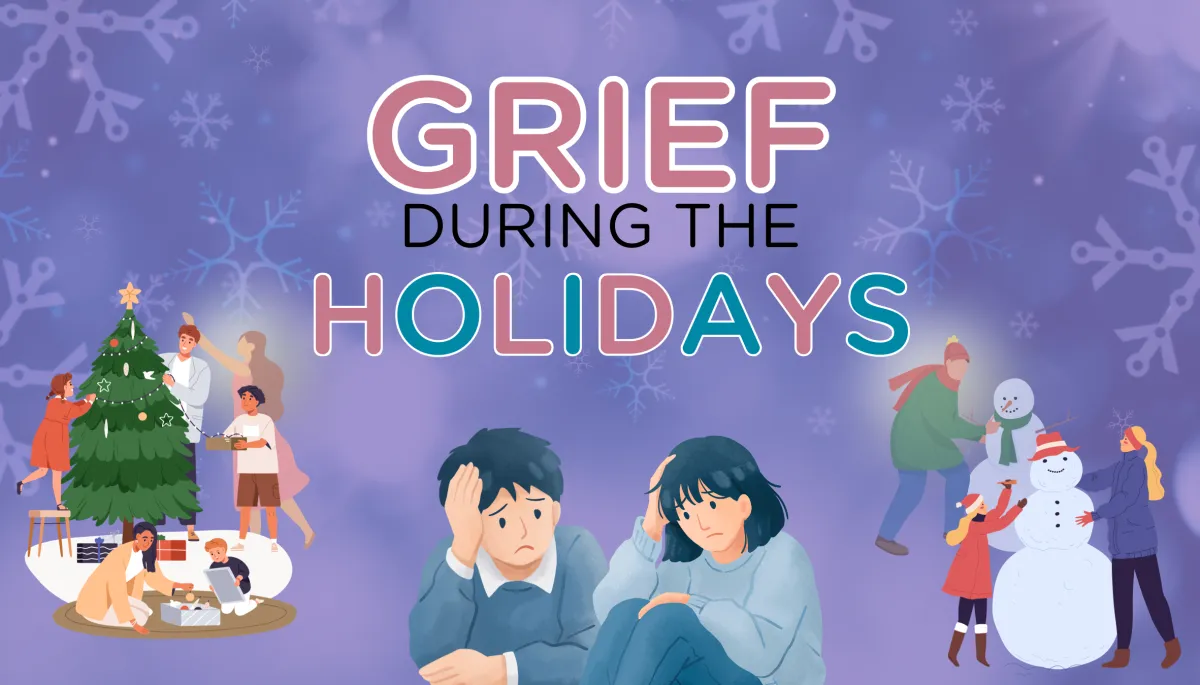General Inquiries: (587) 333-6349 - info@sanostate.com



Grief During the Holidays
Grief is something many people will experience and can be especially heightened around major milestones and holiday times. I am going to speak mainly about the grief we experience after the death of a loved one. But there are other forms of grief as well.
Everyone experiences grief differently; the feelings, thoughts, and resulting behaviours will vary from griever to griever and might depend on things like:
One’s relationship with, and length of time knowing, the loved one. The longer and/or the deeper the connection and attachment to a loved one, potentially the more intense or, at times, complicated grief.
The type of person the griever is. For example, are you a ‘feel-er,’ a ‘do-er,’ sentimental, practical, or both? This will matter in how a person experiences and expresses emotion and what they do (or don’t do) during grief.
The type of person the deceased was. Same as above… were they a ‘feel-er,’ a ‘do-er,’ sentimental, practical, or both? YES – this is a big one as well because when we grieve the loss of a loved one, we are grieving a relationship: one that both parties contributed to and experienced, so the deceased person’s attributes, personality, and ways of being matter too!
How the griever is experiencing grief at any given point. The big take-home here is: At any given point. Contrary to popular opinion or common knowledge, there is no timeline for grief, and, in my opinion, there is no such thing as ‘Stages of Grief’, and I will explain why. The Stages of Grief theory (By Kubler-Ross and colleagues) came about while studying people dying, not grievers. But over the years, it was widely applied to grievers, too. Many people know about this theory and think that 1) denial, 2) anger, 3) bargaining, 4) depression, and 5) acceptance are the phases they will go through during grief and that once they reach acceptance, grief will more or less resolve. I disagree… All of the above are really just feelings, not phases or stages to enter and exit. Grievers will experience all of those feelings PLUS many more. They can have these feelings separately or simultaneously. And there are many other (and sometimes more relevant or personally meaningful) theories about grief. So, if you are going through this, please consider reaching out for more support, knowledge, and education on the grief process.
How much time has passed since their loved one died, and how much they have processed it? This might matter. In my experience, grief never fully resolves, regardless of how much time has passed and the amount of personal and/or therapeutic work a person has done around it. Processing a death (making sense of it) can make coping with grief a little easier, but there can still be tough times. For example, a griever can come across a particular memory or thought about their loved one, and their heart can be shattered all over again, even years after a loved one’s death or after countless hours of therapy and making sense of loss. And that’s ok. Again, it is a very individual thing.
One’s own spiritual or religious understandings and beliefs. Literature shows that if we have some kind of belief about what happens when we die, it can bring about more comfort and peace about our loved ones and, potentially, a new type of relationship with them. It can also ease our own anxiety about mortality.
Now consider that there is all of that above… plus the holidays are coming as well. With holidays, come:
Memories of a loved one that can be both happy and grief-ridden
A heightened awareness of the physical absence of a loved one
An increased sense of loss and loneliness because a griever can no longer attend functions with their loved one, have new experiences with them, buy them gifts or receive gifts from them, or simply call them to chat
In addition, grief can feel BIG year after year, not just ‘the first’ time celebrating a holiday or milestone after a loved one dies.
Here are some ways to Cope with Grief during the holidays:
Honour Your Loved One. Buy them that gift or write in that card for them, anyway! Even though you’ll be keeping it for yourself, it can increase your sense of love and connection to them because you still get to think about them, what they liked or, what you would want to say to them, etc. Doing this will trigger implicit memories (i.e., a felt sense) and that might be comforting and bring peace.
Other ways to do this might be to write to your loved one in a journal, speak aloud to them, or speak about them to other loved ones (‘remember when so-and-so always said/did….”). Also, sometimes social media accounts remain open and a good way to leave a message for them that others might also benefit from seeing.
Engage in Meaningful Traditions and Modify as Needed. Pick one thing that is important to you that you really want to carry on, even if it becomes modified. For example, if your loved one absolutely loved the look of the Christmas tree lights while admiring them in the dark, then try to do the Christmas tree lights – even if you modify and just have a small tree with a few lights instead of the big one. Also, explaining these traditions to other generations provides meaning to them, too.
Be Open to New Ideas. You can decide that you want to do something that you have never done before. It might feel good for one year or many more to come (creating new traditions too). Making new memories does not have to eliminate or diminish old ones.
Talk to Your Loved Ones about How you Feel. Even if you just pick one person to share about how you are feeling and what you might need, this can help. For example, if you really want that tree with the lights (even if it is mini-sized), but just don’t have the capacity to do it, see if your loved one might take the time to do it for you so that you can still enjoy it. Ask for help. Loved ones will usually jump at the opportunity.
Create a List of Coping Strategies. What are some go-to, feel-good (or even a bit better) coping strategies? Ideas like:
Balance of ‘you-time’ mixed with all the other holiday events (or maybe no holiday events, if that feels more appropriate)
Setting boundaries and communicating them ahead of time, where possible or needed
Slowed, deep breathing
Journaling
Going for a walk or engaging in a winter sport
Positive self-talk and affirmations
Yoga or other exercise
Socializing or talking to a close loved one
Therapy
Other self-care tasks, like having a bath, doing your nails or hair, or making/buying a really delicious nutritious meal
We hope you have a safe and loving holiday season, no matter who you might be missing.💙
If you need support, please connect with us HERE or by calling 587-333-6349.
Reference
Kubler-Ross, E. (1999). On Death and Dying. Routledge.
This book has been reprinted many times since its initial publication in 1969.
Disclaimer
Our content is for informational and educational purposes and is not a replacement for professional advice, diagnosis, or treatment. If you're facing mental health concerns, please seek help from a qualified professional for personalized guidance is vital. Every individual's situation is unique, so use the information here at your discretion. While we strive for accuracy, the field of psychology is ever-evolving, and our content may not always reflect the latest research. Please prioritize your privacy by avoiding sharing personal information in comments or interactions. Your well-being is our top concern, so use our content for educational purposes, but remember to rely on professionals for your specific needs.
General Inquiries:
Our Locations:
Additional Resources:
About Us:
We strive for excellence in psychological treatment. We are committed to providing professional, caring, innovative, and research-based services.
© 2024 Sano State Taylored Psychology. All Rights Reserved.

